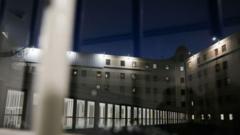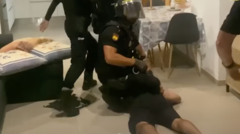Justice and security are on high alert following widespread violence targeting multiple correctional facilities.
**French Prisons Under Siege: Night of Coordinated Attacks Unfolds**

**French Prisons Under Siege: Night of Coordinated Attacks Unfolds**
Overnight assaults mark a serious escalation in tensions surrounding France's fight against drug trafficking.
The Hauts-de-Seine prison in Nanterre was among several French correctional institutions that experienced a night of unprecedented violence. Reports indicate that multiple vehicles were set ablaze outside these facilities, and one jail came under gunfire from an automatic weapon. Justice Minister Gérald Darmanin condemned these actions as "intimidation attempts," suggesting a direct correlation with the government's increasing efforts to tackle drug trafficking.
According to the Parisien newspaper, seven prisons were attacked across the country. Locations included Toulon, Aix-En-Provence, Marseille, Valence, Nîmes, Villepinte, and Nanterre, prompting an investigation by France's national anti-terrorism prosecutor's office. Darmanin announced he was traveling to Toulon to support the officers who faced gunfire during the assault.
While he refrained from naming specific perpetrators, he emphasized that the government was committed to disrupting criminal networks associated with drug trafficking. Interior Minister Bruno Retailleau echoed this sentiment, labeling the attacks an affront to state authority. He vowed a "relentless" response and ordered police to bolster security around prison facilities.
In a statement, the prison guard union FO Justice expressed alarm over the "extremely serious" incidents, sharing visuals of the aftermath, including burnt-out vehicles and bullet-riddled gates. They urgently called for government measures to safeguard prison staff.
These attacks followed a separate incident where seven vehicles were set on fire at the national school of prison administration, raising concerns about escalating violence aimed directly at state institutions. While no group has officially claimed responsibility, some attacked vehicles bore the initials "DDPF," hinting at a possible connection to prisoners' rights advocacy. Additionally, anarchist graffiti was found at various locations, leading investigators to suspect that the attacks were coordinated and in direct response to the government's drug enforcement policies.
In response to the rising crime, a new legislative proposal is moving through the French parliament, aimed at establishing a specialized prosecutor's office to combat drug-related offenses and equip investigators with expanded powers.
According to the Parisien newspaper, seven prisons were attacked across the country. Locations included Toulon, Aix-En-Provence, Marseille, Valence, Nîmes, Villepinte, and Nanterre, prompting an investigation by France's national anti-terrorism prosecutor's office. Darmanin announced he was traveling to Toulon to support the officers who faced gunfire during the assault.
While he refrained from naming specific perpetrators, he emphasized that the government was committed to disrupting criminal networks associated with drug trafficking. Interior Minister Bruno Retailleau echoed this sentiment, labeling the attacks an affront to state authority. He vowed a "relentless" response and ordered police to bolster security around prison facilities.
In a statement, the prison guard union FO Justice expressed alarm over the "extremely serious" incidents, sharing visuals of the aftermath, including burnt-out vehicles and bullet-riddled gates. They urgently called for government measures to safeguard prison staff.
These attacks followed a separate incident where seven vehicles were set on fire at the national school of prison administration, raising concerns about escalating violence aimed directly at state institutions. While no group has officially claimed responsibility, some attacked vehicles bore the initials "DDPF," hinting at a possible connection to prisoners' rights advocacy. Additionally, anarchist graffiti was found at various locations, leading investigators to suspect that the attacks were coordinated and in direct response to the government's drug enforcement policies.
In response to the rising crime, a new legislative proposal is moving through the French parliament, aimed at establishing a specialized prosecutor's office to combat drug-related offenses and equip investigators with expanded powers.




















